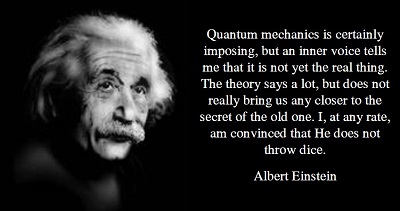SCIENCE & TECHNOLOGY
Quantum Mechanics, Randomness, and the Bible
By Dr. Christopher Plumberg


Single Page/Printer Friendly
Continued from Page One

QM has taught us a great deal about God's creation. It would take me a long time to detail all of the experimentally sound and well-documented portions of what is typically considered QM. However, let me briefly sketch some of the major highlights. Quantum mechanics tells us that, on sufficiently small scales, particles stop behaving like particles and start behaving more like waves. In fact, it's not possible to predict (in general) what the result of any given experiment will be; rather, all one can speak of with any accuracy is the probability of one outcome vs. another. These probabilities can be calculated directly from the particle's wavefunction, whose behavior is described by the Schrödinger equation. This has bothered many people because, as I noted above, some try to interpret this state of affairs as implying that reality is random. However, nothing of the sort is really going on here: the probabilities themselves are still things that we can calculate and compare with experiment. Indeed, if reality were truly random, experiments and physics would become impossible, because there would be no way of predicting even the probability of a particular experimental outcome based only on one's knowledge of the experimental set-up. Rather, it is much more likely that we are simply asking the wrong question, because we are fundamentally ignorant of how the microscopic world truly works. Quantum mechanics is strange, but it doesn't mean we have to abandon our knowledge of the world around us or what God says in His Word.
Quantum mechanics is currently the best explanation we have for all sorts of microscopic physical phenomena, from pair creation and annihilation, to our understanding of why chemistry works the way it does, to scattering experiments (when particles are bounced off of one another), to condensed matter physics (which studies the properties of matter on mesoscopic or "intermediate" scales). Quantum mechanics also fixes a whole host of problems that were present in classical mechanics at the end of the 19th century, in addition to helping us understand emission and absorption lines in atomic and molecular spectra, radioactive decays, and allowing us to develop all sorts of new technologies in medicine, science, and industry. Quantum mechanics is a well-tested idea which treats particles in terms of their wavefunctions, and is perfectly acceptable from a Christian standpoint.
There are, however, many conclusions which are drawn from quantum mechanics which are not Biblical. I have already mentioned some of them, such as the view that reality is random or observed-created. We know that God created the universe (Genesis 1:1) and that He causes it to operate according to fixed, predictable, and regular laws of nature (Genesis 1:14-19, Jeremiah 33:23-26, Hebrews 1:3). So clearly these counter-Biblical conclusions are unacceptable, if they are to be taken in an "ultimate" sense. Similarly, the multiverse theory (or, at least, certain versions of it) requires us to believe that the universe has always existed, which also clearly contradicts the teachings of God's Word, and the multiple-universes (or "many-worlds") interpretation of QM suggests that God continued creating after He rested on the seventh day, which seems unlikely. It's important to emphasize here, however, that none of these counter-Biblical conclusions follow necessarily from the data; they are extrapolations and inferences which are frequently based on data, but are often more fanciful than truly meaningful or observable. Moreover, the term "quantum" is frequently misused to make ridiculous ideas sound scientific. So, for instance, "quantum healing" is not only bad science, it's also very likely to be something of demonic origins. Thus, one should be very cautious of anything described as following from "quantum physics," in spite of the fact that QM itself is perfectly acceptable for the Christian to try to use and understand.
Whatever the strange laws of quantum mechanics teach us, they certainly do not invalidate what we read in God's Word, nor do they undermine our notion of truth. Simply because waves (and wavefunctions) appear to provide a better description of microscopic phenomena than does a purely particle-based theory does not mean that somehow certainty can no longer hold in our macroscopic world. And even though the outcomes of quantum mechanical measurements are difficult (or impossible) for us to predict, this in no way prevents the God who is sovereign over creation from ruling and remaining completely in control of His creation (Psalm 103:19), and knowing in advance the outcome of any particular measurement.
Finally, some Christians have tried to use quantum mechanics to make sense of how God acts in the world. It is not clear that God only interacts with the world through the physical laws that He has created; in fact, there seem to be some clear scenarios (such as the resurrection of Christ) where God interacts with His creation in decidedly non-physical ways. Attempting to explain miracles and other Biblical concepts (such as the human ability to choose between two alternatives, like evil and good) in terms of something fundamentally physical like quantum mechanics is probably unwise, and risks arguing for the truths of Scripture on the basis of fallible, changing human knowledge. Although quantum mechanics is an excellent description of the microscopic world and poses no problem for the Christian, it is important to remember that some things in Scripture simply are not reducible to scientific laws. In short, we should treat it for what it is: a valuable and powerful tool for enabling us to understand and steward God's creation responsibly but something we should be careful to use within the boundaries set by the Word of God.
Tags: Biblical-Truth | Controversial-Issues | Current-Issues | Science-Creation
comments powered by Disqus
Published 5-25-2015

